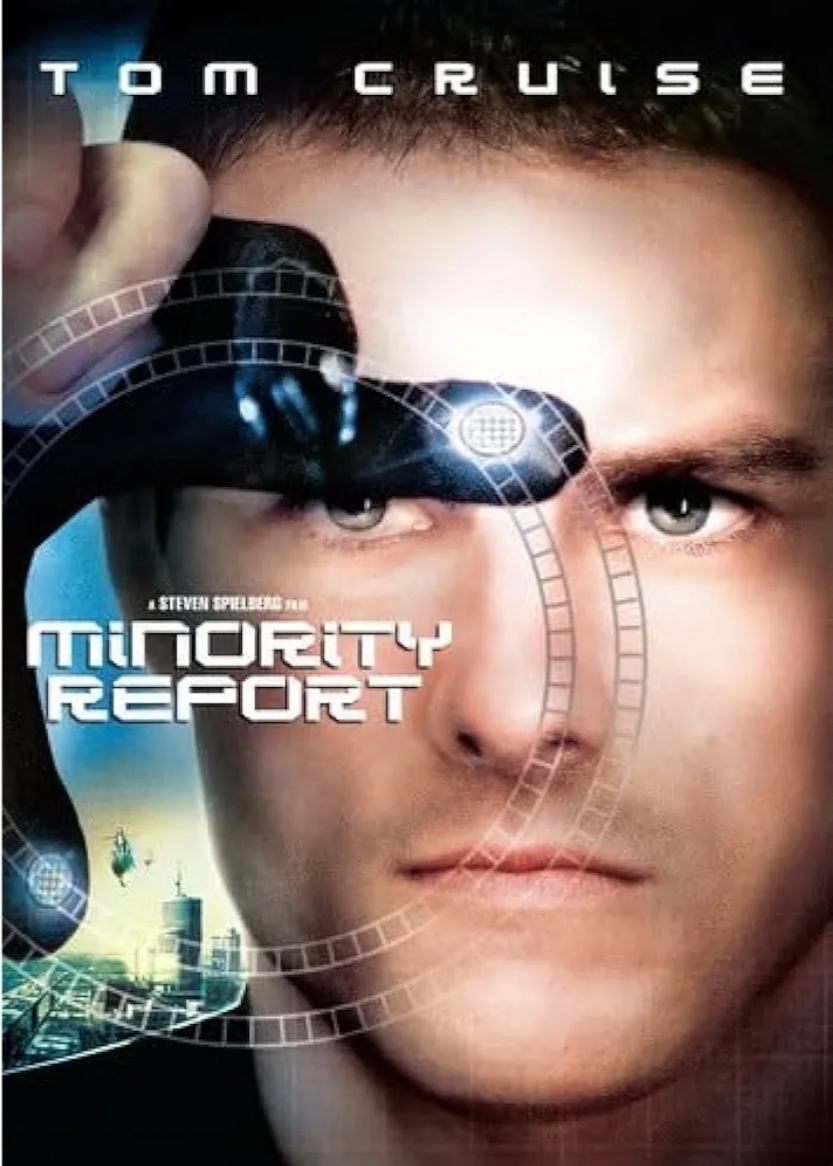Minority Report is a 2002 science fiction film directed by Steven Spielberg and based on a short story by Philip K. Dick. The film stars Tom Cruise as Chief John Anderton and Max von Sydow as Director Lamar Burgess. Set in a futuristic 2054, the film explores themes of free will versus determinism, the morality of preemptive justice, and the ethics of government surveillance.
Plot Summary
The story is set in Washington, D.C., where the government runs a Precrime division that uses three psychics, known as “Precogs,” to predict crimes before they occur. The precogs receive visions of murders, and their predictions allow the police to arrest perpetrators before they commit the crime. The system has led to a crime-free society, but it comes at the cost of infringing on individual freedom and raising ethical concerns about convicting people for actions they have yet to commit.
John Anderton (Tom Cruise) is the head of the Precrime unit and a firm believer in the system because it offers the potential to prevent tragic crimes like the one that caused his son’s disappearance years earlier. However, things take a turn when the system predicts that Anderton himself will commit a murder in the near future. Shocked and confused, Anderton goes on the run to clear his name and uncover the truth behind the prediction.
Max von Sydow plays Director Lamar Burgess, the leader of the Precrime program and a mentor to Anderton. As the story unfolds, it is revealed that Burgess has a hidden agenda. Burgess manipulates the Precrime system to cover up a crime he committed, ensuring his own power and influence. His involvement in Anderton’s case drives much of the film’s dramatic tension.
Major Themes and Concepts
Free Will vs. Determinism:
- One of the film’s central questions is whether people have free will or if their futures are predetermined. The Precrime system assumes that individuals have no choice but to act according to the visions provided by the Precogs.
- Anderton’s story is a quest to prove that people can change their fate, questioning whether justice can be served by punishing people for crimes they have not yet committed.
Surveillance and Privacy:
- The world of Minority Report is a dystopian surveillance state, where authorities use advanced technology to monitor citizens and predict their actions. The film explores the dangers of an all-seeing government and the ethical problems of such a system.
- It also delves into the loss of personal privacy in the name of security, a topic that resonates with contemporary concerns over surveillance and data privacy.
Justice and Morality:
- The Precrime system presents a moral dilemma: is it just to punish someone for something they haven’t done yet but are predicted to do? The film critiques the idea of absolute justice and exposes the dangers of a flawless system of crime prevention.
- Anderton’s personal journey challenges the validity of punishing people based on mere predictions, even when those predictions have been accurate in the past.
Technology and Society:
- The film showcases a highly futuristic world filled with advanced technologies such as personalized advertisements, retina scanning, and virtual interfaces. While the technology serves to create a more efficient society, it also raises questions about control and manipulation by the state.
Max von Sydow as Director Lamar Burgess
Max von Sydow’s character, Lamar Burgess, is the antagonist of the film. He is the Director of the Precrime division and Anderton’s mentor. His character initially appears to be a wise and benevolent leader, but it is eventually revealed that he is involved in a conspiracy to protect his own interests.
- Burgess’ Role: Burgess is the person who ultimately benefits from the success of the Precrime system, as it has propelled him into a powerful position. He is deeply invested in maintaining the system, even if it means compromising the truth.
- Moral Conflict: Burgess’ dark secret is that he has used the Precrime system to hide his own past crime. In an attempt to protect the system and his legacy, he goes to great lengths to ensure its continuation, even if it means sacrificing Anderton.
- Final Confrontation: In the film’s climactic moment, Anderton confronts Burgess with the truth. Burgess is given a choice: either commit the murder predicted by the Precogs, proving the system’s infallibility, or refrain from doing so and discredit the Precrime program. In a dramatic moment of moral reckoning, Burgess takes his own life, preserving the program’s image in the short term but dooming it in the long run.
Critical Reception
Minority Report was widely praised for its thought-provoking themes, stunning visual effects, and compelling performances, especially by Tom Cruise and Max von Sydow. The film was a commercial and critical success and is regarded as one of the best science fiction films of the 21st century. It sparked discussions about privacy, free will, and the dangers of preemptive justice, making it both a thrilling action movie and a deeply philosophical work.
Legacy
Max von Sydow’s performance as Lamar Burgess contributed to the film’s success by adding gravitas to the role of a man conflicted by his moral failings. His portrayal of a paternal yet morally compromised leader helped elevate the film’s exploration of authority, power, and corruption.
Minority Report continues to be relevant in discussions about the ethics of surveillance, artificial intelligence, and the tension between security and liberty.






